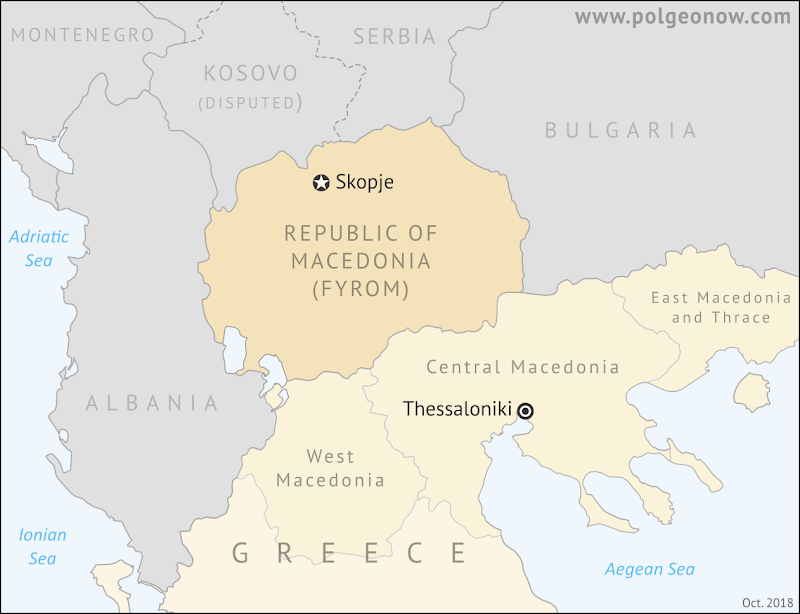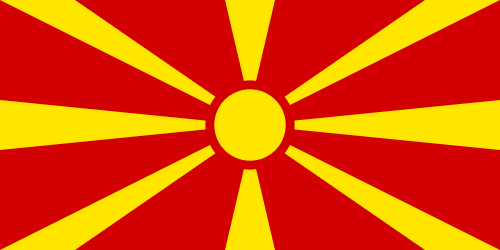 | |
| Besides the controversially-named Republic of Macedonia (FYROM), Greece has three Macedonia provinces too. Contact us for permission to use this map. |
Referendum in the Republic of Macedonia (FYROM)
Last Sunday, people in Southeastern Europe's Republic of Macedonia - also known as FYROM, an acronym for "former Yugoslav Republic of Macedonia" - voted on whether to approve a recent deal signed with Greece. The deal famously includes changing the country's name to "Republic of North Macedonia", but it's actually about a lot more than that.For the details on the referendum and its results, check out our companion article: What Happened in the "North Macedonia" Referendum?
Greece has long-running objections to use of the name "Macedonia", tied up with ownership of ancient Macedonian history, and has cited those objections when blocking its neighbor from membership in the European Union and NATO. You could write whole books about the history behind this dispute, but we summarized it for you in last weekend's article, "Macedonia": Why is a Name So Important?
The thing is, news coverage has been leaving out a huge part of the story: the rest of the deal between Greece and the Republic of Macedonia/FYROM. So we've written another article to summarize that for you too!
What's at Stake in the "Macedonia" Deal?
Contrary to news headlines calling last Sunday's vote a "name referendum", the future name of today's Republic of Macedonia is only a small part of the deal between the two neighbors. In fact, the question on ballots didn't even mention the name change.Here's a selection of important and interesting points paraphrased from the full text of the agreement:
Names and Identities
- The smaller country will permanently change its name to "Republic of North Macedonia", or "North Macedonia" for short, and the change will be codified in its constitution. Both countries will be required both to accept the name change in their own government affairs and to support its use in international organizations, and other countries will be asked to respect the name change too. The names "Macedonia", "Republic of Macedonia", and "FYROM" will all be abolished from official use.
- A person from North Macedonia will be known as a "citizen of the Republic of North Macedonia" in their passport, but can be called either that or a "Macedonian" in other official contexts.
- The official language of North Macedonia will officially be called the "Macedonian language"
- Greece and North Macedonia will formally acknowledge that they each have their own separate definitions of the terms "Macedonia" and "Macedonians"
- This agreement can't be used to police the way citizens of either country use the words "Macedonia" and "Macedonians" - only the way their governments use them officially.
- North Macedonia can keep the ISO country codes MK and MKD, except on car license plates, where they must be changed to NM or NMK.
- Government offices and organizations in North Macedonia can't have "Macedonian" in their name, and have to use "of North Macedonia" instead.
- Private companies and organizations in North Macedonia without a government charter or funding are allowed to use "Macedonian" in their names, though businesses from the two countries will be pushed to collaboratively resolve any conflicts between their trademarks and brand names.
- North Macedonia will acknowledge that its language and culture are not related to the language and culture of ancient Macedonia, and are "distinctly different" from it.
- Within six months of finalizing the agreement, North Macedonia will make an effort to remove references to ancient Greek history from its monuments and public buildings, and will stop using Alexander the Great's Vergina Sun symbol for any official purposes.
- The two countries will establish a joint committee of historians, archaeologists, and educators to objectively determine the history of the region and correct any politically-motivated inaccuracies in textbooks and official maps.
- Once the deal is finalized, Greece promises to support North Macedonia's membership applications to the EU and NATO, and promises not to block it from these organizations or any others that Greece is a member of.
- Neither Greece nor North Macedonia will ever claim any of each other's territory, say their country was supposed to be bigger, or support any calls for the border between them to be redrawn in any way.
- Each country promises not to ever threaten the other country militarily, or to support or harbor any rebel groups active in it.
- Both countries promise to be "guided by the spirit and principles of" democracy, freedom, equality, and human rights, but can't use that as an excuse to invade each other.
- Each country will end any negative propaganda directed at the other, and will do everything it legally can to keep its citizens from promoting hatred or hostility toward its neighbor.
- Each country will upgrade its "liaison offices" in the other county to become official embassies and consulates.
- Three specific treaties between Greece and now-defunct Yugoslavia will become binding between Greece and North Macedonia, with more possibly to come.
 Short Name (used internally): Short Name (used internally): • Macedonia (English) • Makedonija ("Macedonian") Official Name (in constitution): • Republic of Macedonia (English) • Republika Makedonija ("Macedonian") Other names used officially: • Former Yugoslav Republic of Macedonia (FYROM) (international organizations) Capital: • Skopje |
- The two countries agree to become friends, talk to each other a lot, and cooperate in every imaginable area.
- Greece confirms its legal obligation to allow landlocked North Macedonia's ships to freely transit through its territory, to share in harvesting nearby marine resources, and to assume all the rights that any other country's ships would have in Greek waters.
- Each country will "refrain from imposing any impediment the movement of people or goods" to or from the other country, and will cooperate on building more official crossings along their shared border.
- And more...over a quarter of the agreement's text is a description of future economic, military, police, scientific, judicial, athletic, and other cooperation between Greece and Macedonia.
- The parliament of future North Macedonia has agreed make the necessary constitutional amendments for the change by the end of 2018, and Greece will ratify the deal only after that.
- North Macedonia's government will have five years to finish changing its name on all documents and materials issued for international audiences, and longer to change the name on materials that are for internal use only (the latter deadline is tied to the country's EU membership process).
- A joint council combining the two countries' governments will be formed to manage the implementation of the deal, and either country will be equally entitled to raise objections to any alleged violations in the international sphere.
Controversial Agreement
As you can see, Greece and the Republic of Macedonia/FYROM have both won and lost some things in the agreement, so it's not too hard to imagine why many people in each country are opposed to it. The name change is an important compromise for sure, but to opponents of the agreement, other points are probably an even bigger deal.For example, agreeing to call North Macedonia's language "Macedonian" is a massive deal breaker for many Greeks, who are passionate about reserving the name "Macedonian" for the unrelated language of culturally-Greek ancient Macedonia (which was also located mostly in what's now Greece). They generally consider their neighbor's language to be a variety of Bulgarian.
On the other side of the coin, patriots in the smaller country, many of whom believe they're descended from the the ancient Macedonians, are livid at having to renounce all ties to the historical kingdom, not to mention getting restrictions imposed by Greece on how their government is allowed to even use the terms "Macedonia" and "Macedonian".
Whether they'll prevail over the deal's supporters remains to be seen, just as much as ever after the complicated results of last Sunday's referendum. But whichever way it goes, you can bet you'll hear about it here - and you can always check for updates by viewing all "Macedonia" articles on PolGeoNow!
Update 2019-02-19: The name change is officially complete! See our new article: "North Macedonia" Name Change Goes Into Effect for the details, and a timeline of the whole approval process!
Graphic of the Republic of Macedonia (FYROM) flag is in the public domain (source).
